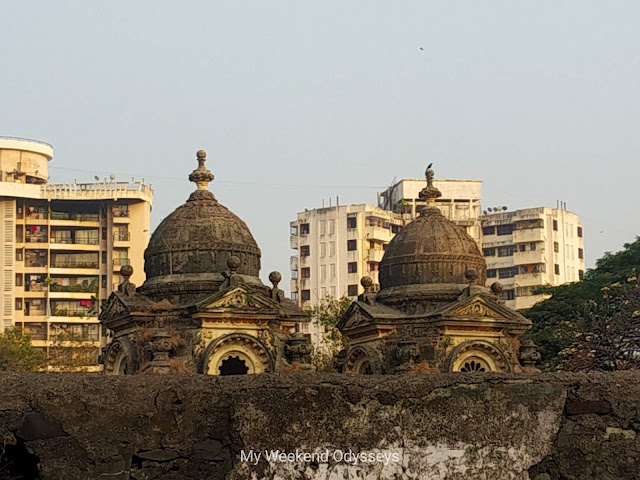The Mausoleums of Sassoon family and Jewish cemetery in Chinchpokli
It is hard to imagine any Jewish landmark in Mumbai and Pune which doesn't have Sassoon family connections. David Sassoon - A Baghdadi Jew was treasurer of Baghdad when he had to flee his city from the persecution of the ruler of Baghdad - Daud Pasha. He arrived in Bombay in 1832 and over a period of time became a wealthy businessman trading in cloth, jute, and opium. He and his family have been instrumental in building synagogues in Mumbai and Pune as well as many prominent buildings like David Sassoon library, Masina hospital, Sassoon docks, Bank of India building in Fort area of Mumbai as well Sassoon hospital, Lady Rachel Sassoon dispensary in Pune to name a few.
Counted in one of the old areas of Mumbai - Chinchpokli, It lies on the central railway line of Mumbai local trains. While traveling by train one can notice some monuments as soon as trains cross the Chinchpokli station. These are the mausoleums of the Sassoon family in a Jewish cemetery. This cemetery was built by the son of David Sassoon, Sir Elias David Sassoon in 1878 to cater to the needs of the Baghdadi Jews community in memory of his son Joseph who died in Shanghai - China in 1860. A plaque indicating the same lies on the entrance of the cemetery.
The Jews cemetery has three Victorian-style mausoleums in the middle of the graveyard which also has a few Chafa (Frangipani) trees amidst these dead grounds. Two identical structures are matching mausoleums, one-storied high, and have marble sarcophagus with Hebrew inscriptions and a beautifully carved cupola. These mausoleums are the resting place of Sir Jacob Sassoon and his wife Lady Rachael.
Yet another mausoleum which is a standalone structure is situated a little distance from the two identical ones is the resting place of Sir Albert Sassoon.
Spread over two acres, The cemetery has over 1000 graves and finds mention in the BMC heritage list. What is even more striking is here also lies buried graves of Jews who couldn't escape the ovens of Nazi-occupied death camps of Auschwitz and other concentration camps. The graves or memorials were erected by relatives of Holocaust victims. India's first Miss India, Pamela Abraham who was also an actress and film producer in Bollywood gets a mention in the tablet dedicated to Abraham's family here.














Comments
Post a Comment